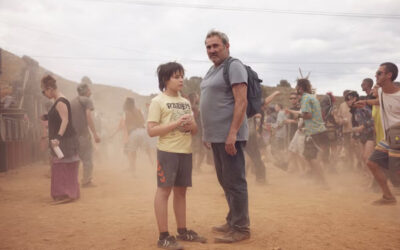by Alexandra I. Mas
A one-man show carved from the scale of a life lived under bright lights, intimate, theatrical, and pulsing with humanity. Bono, equal parts rock star and raconteur, walks us through the seismic moments and quiet shadows of his life, tethered always to the songs that gave them shape. A film that will send you diving back into U2’s music with fresh ears—and searching late into the night for the next chance to catch them live.
Drawn from Surrender: 40 Songs, One Story, the memoir he wrote alongside his lifelong love, Alison Hewson, this is not only a book tour, it’s theatre of the soul.
“I’m still trying to convince myself this is a book tour,” he quips.
But the stage betrays him, or perhaps reveals him. Bono will forever remain a showman. Sparse and elemental, the set consists of just a table, a few chairs, and the warm simplicity of classic lighting. Then comes the music, ethereal textures from Gemma Doherty on harp, keys, and voice, and the cello of Kate Ellis, lifting the room into a trance-like reverie.

Director Andrew Dominik (This Much I Know to Be True, Blonde, The Assassination of Jesse James by the Coward Robert Ford, Killing them Softly) captures the performance in stark black and white, with flickers of color breaking through like memory itself. Filmed at the Beacon Theatre in New York, it opens with a literal wound: Bono’s heart, physically “off-center,” failing him in 2016. After emergency open-heart surgery, he found himself, for the first time, face-to-face with doubt. Raised in a Catholic household with Protestant sensibilities, Bono reflects on the contradictions that shaped his soul and his lyrics.
The show pays quiet tribute to his parents: Iris and Bob Hewson. His mother, gone too soon, remains a gaping absence in his life, a silent scream still echoing. His father, a stern and emotionally distant man, nevertheless passed down the gift of song.
“You’re a baritone trying to be a tenor,” Bob once told him— a line both cutting and oddly full of love. The need to be seen, to rise to a father’s unreachable expectations, even duets with Pavarotti couldn’t quite earn that nod of approval. And yet, tenderness shines through in a story about Bob softening before Princess Diana:
“Three hundred years of Irish oppression disappeared in front of one princess,”
Bono recalls with wry wonder.
Dominik inserts just one archival image: Live Aid, 1985. A moment that shook the world and redefined what music could do. It wasn’t just a concert—it was a calling. U2’s performance on that stage catapulted them into global consciousness and set Bono on a lifelong path of activist artistry, where stadium anthems and humanitarian battles would walk hand in hand.

Offstage, another thread emerges, a dream perhaps born in his father’s heart. In the Sorrento salon in Glassnevin, Dublin, father and son shared silence and sparse dialogues. Now, decades later, Bono sings at the Teatro di San Carlo in Naples, across the bay from Sorrento—a tribute carved in marble and memory.
Then there’s The Edge, his faithful companion in sound and soul. Bono recalls a week that would change everything: he joined U2, met his future wife, and forged a friendship with David Evans that would outlast nearly everything.
“It felt like my whole life was written in that one moment,” he says.

But at its core, Stories of Surrender is a love letter. To Alison, the future activist, the 15-year-old girl he met when he was 16, who married him in 1982 and stood beside him through every dizzying chapter.
“She saw something in me I couldn’t yet see in myself,” he confesses.
On their honeymoon, he began writing Sunday Bloody Sunday. “I had to explain to her that the album we were working on would be called War.”
Ali Hewson believed in the man he would become, long before he stepped into that version of himself. Through his absences, his deep creative immersion, she kept walking beside him, and became his North Star.
Stories of Surrender is technically a documentary about a theatrical concert, but I consider it a confession in song and silence… It’s an act of disclosure. A lyrical portrait of a man who, from the mountaintop of fame, still dares to believe in the transformative power of love, art, and conviction. A man still trying to change the world.





